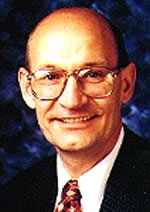 |
Tulane
Engineering Forum
|
|
|
|
|
|
| |
| Opportunities |
| |
| |
| |
| |
Raymond J. Gorte
Dr. R. J. Gorte received his BS in Chemical Engineering from the University of Wisconsin in 1976 and his PhD in Chemical Engineering from the University of Minnesota in 1981. While completing his PhD, he worked for Shell Development Corporation in Houston, Texas from June through August of 1977 and for the General Motors Technical Center in Warren, Michigan from June through November of 1979. He joined the faculty at the University of Pennsylvania in February of 1981. Since joining Penn, Dr. Gorte has served as Chairman of Chemical Engineering from 1995 to 2000 and was the Carl V. S. Patterson Professor of Chemical Engineering from 1996 through 2001. He is currently the Russell Pearce and Elizabeth Crimian Heuer Professor of Chemical Engineering at the University of Pennsylvania. He is author of more than 170 publications in refereed journals and has received a number of awards for his research, including the 1997 Parravano Award of the Michigan Catalysis Society, the 1998 Philadelphia Catalysis Club Award, the 1999 Paul Emmett Award of the North American Catalysis Society, and the 2001 Penn Engineering Distinguished Research Award. He is on the Board of Editors of Applied Catalysis A and the Journal of Molecular Catalysis A. Among his service activities to the Catalysis community, he has served as Chairman of the Gordon Conference on Catalysis (1998) and Program Chairman of the 12th International Zeolite Conference (1998). His work on fuel cells has been featured on NPR Science Friday, Reuters, and MSNBC. He is also well known for his research on zeolite acidity and for metal-support effects, especially with ceria-supported precious metals, used in automotive emissions control. Some Key Publications: 1)
"Direct Oxidation of Sulfur-Containing
Fuels in a Solid-Oxide Fuel
Cell", H. Kim, J. M. Vohs,
and R. J. Gorte, Journal of
the Chemical Society, Chemical
Communications, 2001, 2334-2335.
By: Raymond J. Gorte
Fuel
cells are an attractive method
for electrical power generation
because they offer the possibility
of very high efficiencies compared
to normal heat engines. One
of the major hurdles preventing
their implementation for a wide
variety of applications is the
fact that, until recently, only
H2 could be used as the fuel.
The first part of this talk
will describe the operating
principles behind the major
fuel-cell technologies and the
anticipated applications for
these technologies. Special
attention will be given to a
discussion of the advances that
will be required before fuel
cells can be commercialized.
The second part of the talk
will describe some of our own
research aimed at using hydrocarbon
fuels, including liquids, to
generate electrical power without
the need for first reforming
that fuel to H2. |
 |